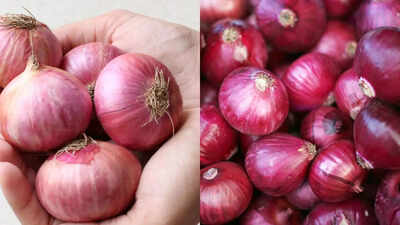Desi vs red onion: Which Indian onion is best for reducing inflammation and boosting health |

Onions are not just a culinary essential in Indian kitchens; they are a natural source of healing. Desi onions, with their sharp, earthy flavour, are packed with compounds like sulphur, quercetin, and flavonoids that help fight inflammation and boost immunity. Red onions, milder and slightly sweet, are rich in antioxidants and ideal for raw consumption, supporting digestion and overall wellness. Including both varieties in your diet provides a balance of taste and health benefits, from strengthening the immune system to reducing oxidative stress. Understanding the unique properties of desi and red onions allows you to make informed choices, turning everyday meals into a natural way to support long-term health and manage inflammation effectively.
How onions naturally reduce inflammation and boost overall health
Every Indian meal often begins with the sound of onions sizzling in hot oil. Beyond their flavour, onions contain compounds like quercetin, flavonoids, and phenolic acids. These natural ingredients help calm inflammation in the body, which is linked to fatigue, digestive issues, and chronic pain.Scientific studies have shown that onions can reduce oxidative stress, the internal wear and tear that triggers inflammation. Regular consumption of onions may also protect against heart disease, diabetes, and other long-term conditions. When you add onions to your meals, you are quietly supporting your body’s natural healing processes.
Desi onions and red onions: Health benefits, anti-inflammatory properties, and how to use them
Desi onions are smaller, pink in colour, and have a strong aroma. Their intense flavour signals high concentrations of sulphur compounds and flavonoids, which are essential for fighting inflammation.Research has found that desi onions have higher levels of quercetin and anthocyanins than many other onion varieties. These antioxidants protect cells from damage, strengthen immunity, and support the body’s natural detoxification process. In traditional home remedies, crushed desi onion mixed with honey can soothe a cough, and eating them raw may help ease joint pain.Desi onions are ideal for slow-cooked Indian dishes, where their strong flavour blends with spices and oils. Their bold taste comes with powerful health benefits, though moderation is recommended for people with sensitive stomachs.Red onions are widely used in Indian kitchens because they are large, glossy, and mild in taste. Their gentle flavour makes them suitable for raw consumption in salads, raitas, or as a garnish.Studies have confirmed that red onions are rich in quercetin and anthocyanins. These compounds help lower inflammation and protect against heart disease and high blood pressure. Eating red onions raw preserves their antioxidants, supporting digestion, metabolism, and overall wellness. They are also easier to digest, making them perfect for regular inclusion in your diet.
Desi or Red Onions: Which should you choose
Choosing between desi and red onions depends on your needs and taste preferences. Desi onions provide stronger anti-inflammatory and immune-boosting benefits, while red onions are milder, easier to eat raw, and suitable for daily consumption.Using both types in your meals is the most balanced approach. Desi onions add depth and strength to cooked dishes, while red onions provide fresh nutrition and flavour. Together, they deliver a mix of antioxidants and anti-inflammatory compounds that enhance overall health.
How to prepare onions for maximum benefits
The way onions are cooked affects their healing potential. High heat can destroy sensitive compounds like quercetin and flavonoids, so gentle cooking is recommended.
- Eat onions raw in salads or chutneys to preserve nutrients.
- Lightly sauté onions on low to medium heat instead of browning them completely.
- Add onions near the end of cooking in soups or stews to retain antioxidants.
- Combine red and desi onions to balance flavour and health benefits.
Small adjustments like these can make your everyday meals more nutritious without changing your cooking routine.
Storing onions to keep them fresh and nutritious
Proper storage helps onions retain their nutrients and flavour.For whole onions:
- Keep them in a cool, dry, and well-ventilated place.
- Avoid refrigeration, which can increase moisture and spoilage.
- Store away from potatoes, which release gases that accelerate decay.
For cut or peeledonions:
- Store in airtight containers in the fridge and use within two to three days.
- Simple storage habits can make a big difference in keeping onions fresh and potent.
Onions are a timeless ingredient in Indian kitchens, full of flavour and health benefits. Desi onions bring strength and medicinal value, while red onions add freshness and gentle nutrition. Both support inflammation reduction, immunity, and long-term wellness.Including both types in your diet is a simple, affordable, and effective way to naturally support your health. Also Read | Multigrain atta vs Whole Wheat Atta: Choosing the healthiest flour for your diet and optimal health






